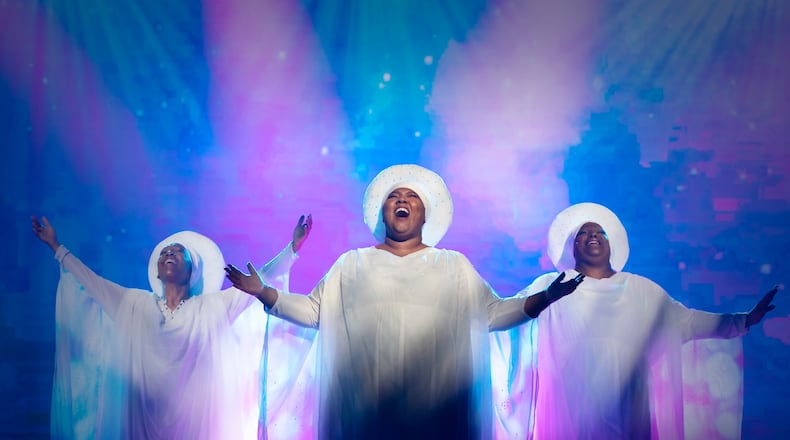This story was originally published by ArtsATL.
From “A Christmas Carol” to “A Charlie Brown Christmas” and “It’s A Wonderful Life,” there is an undeniable similarity among the traditional Christmas TV specials, stage plays and movies that show up year after year: Most of them were created for white audiences.
But “Black Nativity: A Gospel Christmas Musical Experience” has for many years widened the scope of seasonal fare in Atlanta and across the country. Running Dec. 12-22 at Georgia Tech’s newly renovated Ferst Center for the Arts, the music and dance celebration reimagines the Christmas story through the lens of Black culture.
“Black Nativity” is an adaptation of poet and playwright Langston Hughes’ stage production, which was first performed off-Broadway in December 1961. The original title was “Wasn’t That a Mighty Day?” But before the opening, Hughes changed it to “Black Nativity.” African American dancers Alvin Ailey and Carmen de Lavallade were originally cast as Joseph and Mary but withdrew a week before the show opened because they apparently objected to the new title’s racialization of a religious term.
Now performed by different organizations nationwide, “Black Nativity” is a theatrical spectacle versatile enough to incorporate elements of contemporary Black music and artistry with traditional African motifs, plus a liberal allowance for individual creativity from one production to the next. It has been produced in Atlanta for many years by various companies, among them True Colors Theatre Company.
Credit: Photo by Shoccara Marcus
Credit: Photo by Shoccara Marcus
“My company took the reins of producing ‘Black Nativity’ about 13 years ago,” says Dominion Entertainment Group CEO Robert John Connor. “We’ve had the opportunity to continue the legacy of this holiday tradition in the Atlanta area.”
Returning performers this season include actor-singer Latrice Pace, winner of a Suzi Bass Award for her performance in “The Color Purple” at Actors’ Express, and gospel singer and Suzi Bass Awards nominee Lawrence Flowers.
“Black Nativity” has been a passion of Connor’s since he performed in the play as a cast member in 1996 and 1997, when he was in his mid-20s. As his career moved from acting to directing, he perceived potential for “Black Nativity” as an Atlanta institution. The production has become a central and ever-evolving staple of Dominion Entertainment’s repertoire, which offers a smorgasbord of Black artistry.
But its historical significance runs deeper.
“Historically, it incorporated a lot of hymns and spirituals,” explains Connor, a Morehouse College graduate. Now the show includes a broad spectrum of music, including gospel. It became important to the Black community, especially in the 1960s when Black culture was overlooked in the vast array of holiday entertainment.
“During that Civil Rights era, Langston was trying to take our cultural artifacts — our dance, our song, our costumes, our regalia — and infuse that into the biblical story of the birth of Christ,” Connor says.
Credit: shoccara marcus
Credit: shoccara marcus
Sixty years later, “Black Nativity” has far-reaching appeal in performances across the country. It tells the Christmas story with a wide array of Black cultural traditions that speak not only to Black audiences but to the universal human themes embodied in the Nativity story.
The show opens in a modern-day African American church on Christmas Day and later takes audiences to Africa, not the Middle East, for Mary and Joseph’s story.
“The actors are adorned in Africanized costumes, and there’s African dance,” Connor says. “It’s a really rich experience of acting, singing and dancing that ultimately leaves the audience member with a sense of hope. It’s from a Black perspective, but the story is universal.”
That universal appeal is confirmed when audience members of all ages, ethnicities, cultural backgrounds and even non-Christian faiths attend, Connor says.
“It’s sewn together so magically that by the end of the show, you go ‘Wow! What just happened?’ The unique nature of the show is far more inviting than saying, ‘This is for us.’”
THEATER PREVIEW
“Black Nativity: A Gospel Christmas Musical Experience”
nativ 12-22 at Ferst Center for the Arts. 7:30 p.m. Thursdays-Saturdays; matinees at 2 p.m. Saturdays, 3 p.m. Sundays. $37-$79. 349 Ferst Drive NW, Atlanta. 404-894-9600, arts.gatech.edu
::
Jordan Owen began writing about music professionally at the age of 16 in Oxford, Mississippi. A 2006 graduate of the Berklee College of Music, he is a professional guitarist, bandleader and composer. He is currently the lead guitarist for the jazz group Other Strangers, the power metal band Axis of Empires and the melodic death/thrash metal band Century Spawn.
Credit: ArtsATL
Credit: ArtsATL
MEET OUR PARTNER
ArtsATL (artsatl.org) is a nonprofit organization that plays a critical role in educating and informing audiences about metro Atlanta’s arts and culture. ArtsATL, founded in 2009, helps build a sustainable arts community contributing to the economic and cultural health of the city.
If you have any questions about this partnership or others, please contact Senior Manager of Partnerships Nicole Williams at nicole.williams@ajc.com.
About the Author
Keep Reading
The Latest
Featured






